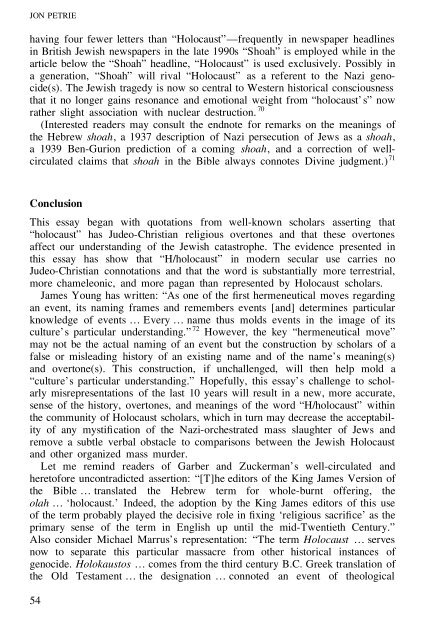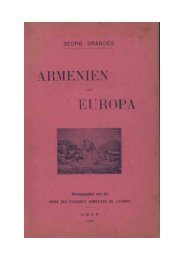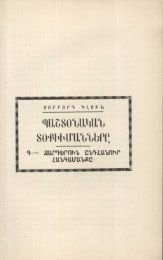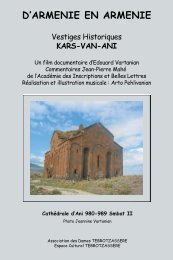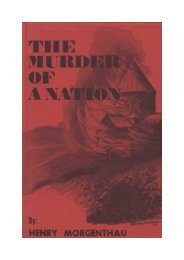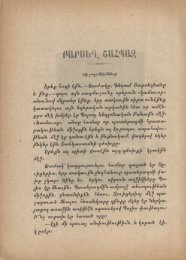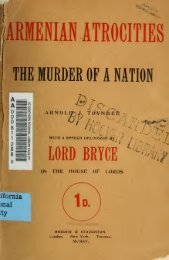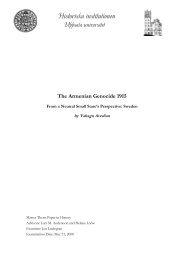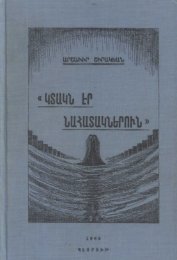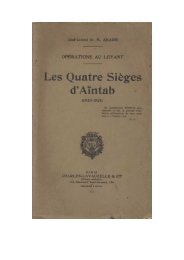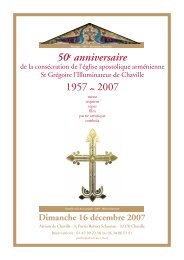The secular word HOLOCAUST: scholarly myths, history, and 20th ...
The secular word HOLOCAUST: scholarly myths, history, and 20th ...
The secular word HOLOCAUST: scholarly myths, history, and 20th ...
You also want an ePaper? Increase the reach of your titles
YUMPU automatically turns print PDFs into web optimized ePapers that Google loves.
JON PETRIEhaving four fewer letters than “Holocaust”—frequently in newspaper headlinesin British Jewish newspapers in the late 1990s “Shoah” is employed while in thearticle below the “Shoah” headline, “Holocaust” is used exclusively. Possibly ina generation, “Shoah” will rival “Holocaust” as a referent to the Nazi genocide(s).<strong>The</strong> Jewish tragedy is now so central to Western historical consciousnessthat it no longer gains resonance <strong>and</strong> emotional weight from “holocaust’s” nowrather slight association with nuclear destruction. 70(Interested readers may consult the endnote for remarks on the meanings ofthe Hebrew shoah, a 1937 description of Nazi persecution of Jews as a shoah,a 1939 Ben-Gurion prediction of a coming shoah, <strong>and</strong> a correction of wellcirculatedclaims that shoah in the Bible always connotes Divine judgment.) 71ConclusionThis essay began with quotations from well-known scholars asserting that“holocaust” has Judeo-Christian religious overtones <strong>and</strong> that these overtonesaffect our underst<strong>and</strong>ing of the Jewish catastrophe. <strong>The</strong> evidence presented inthis essay has show that “H/holocaust” in modern <strong>secular</strong> use carries noJudeo-Christian connotations <strong>and</strong> that the <strong>word</strong> is substantially more terrestrial,more chameleonic, <strong>and</strong> more pagan than represented by Holocaust scholars.James Young has written: “As one of the rst hermeneutical moves regardingan event, its naming frames <strong>and</strong> remembers events [<strong>and</strong>] determines particularknowledge of events … Every … name thus molds events in the image of itsculture’s particular underst<strong>and</strong>ing.” 72 However, the key “hermeneutical move”may not be the actual naming of an event but the construction by scholars of afalse or misleading <strong>history</strong> of an existing name <strong>and</strong> of the name’s meaning(s)<strong>and</strong> overtone(s). This construction, if unchallenged, will then help mold a“culture’s particular underst<strong>and</strong>ing.” Hopefully, this essay’s challenge to <strong>scholarly</strong>misrepresentations of the last 10 years will result in a new, more accurate,sense of the <strong>history</strong>, overtones, <strong>and</strong> meanings of the <strong>word</strong> “H/holocaust” withinthe community of Holocaust scholars, which in turn may decrease the acceptabilityof any mysti cation of the Nazi-orchestrated mass slaughter of Jews <strong>and</strong>remove a subtle verbal obstacle to comparisons between the Jewish Holocaust<strong>and</strong> other organized mass murder.Let me remind readers of Garber <strong>and</strong> Zuckerman’s well-circulated <strong>and</strong>heretofore uncontradicted assertion: “[T]he editors of the King James Version ofthe Bible … translated the Hebrew term for whole-burnt offering, theolah … ‘holocaust.’ Indeed, the adoption by the King James editors of this useof the term probably played the decisive role in xing ‘religious sacri ce’ as theprimary sense of the term in English up until the mid-Twentieth Century.”Also consider Michael Marrus’s representation: “<strong>The</strong> term Holocaust … servesnow to separate this particular massacre from other historical instances ofgenocide. Holokaustos … comes from the third century B.C. Greek translation ofthe Old Testament … the designation … connoted an event of theological54


